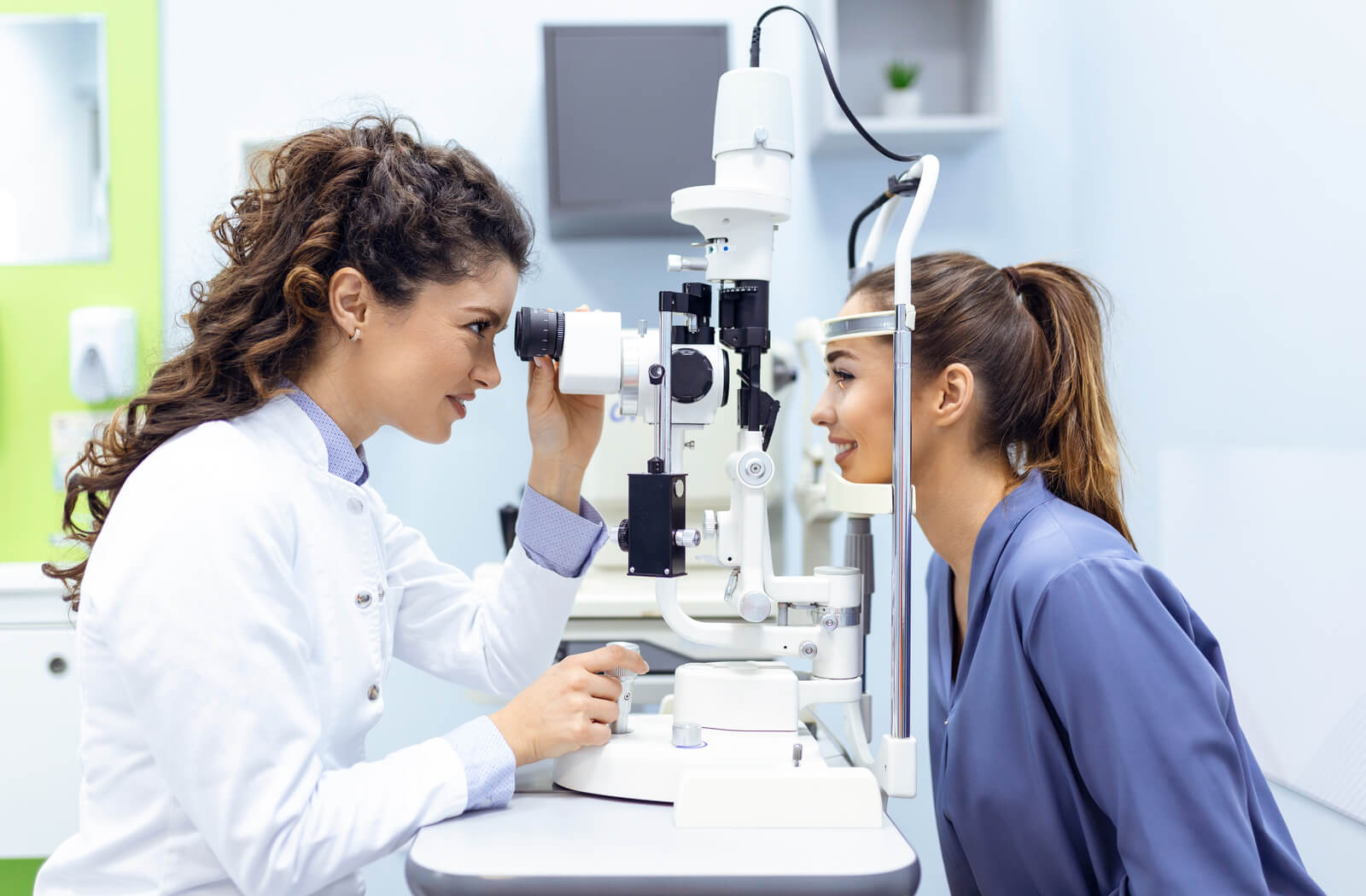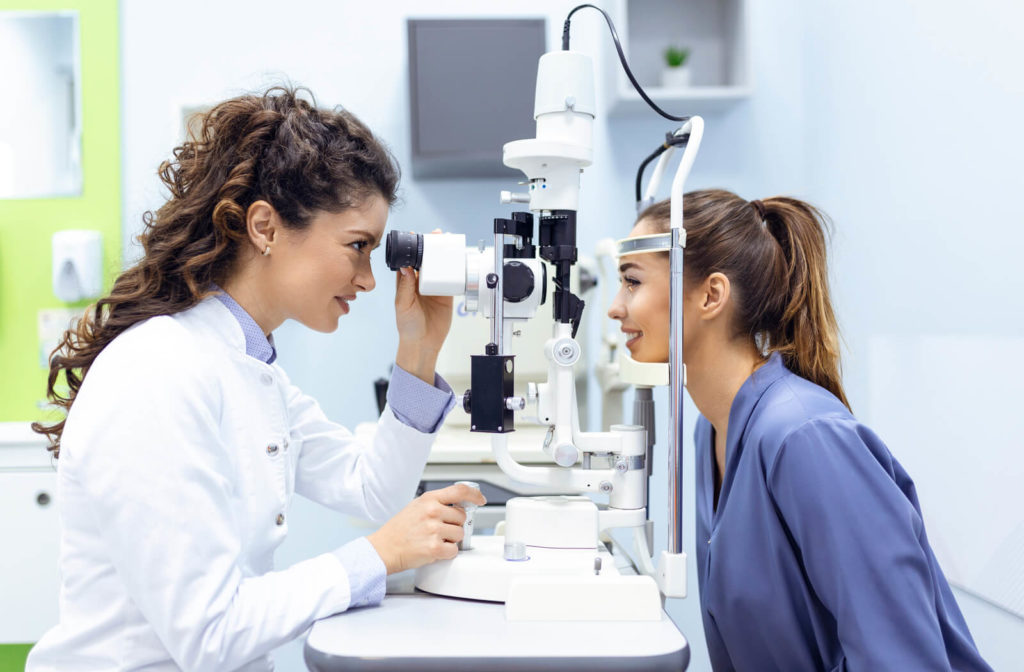Eye examinations aren’t simply to measure the distance from which you can see things. A comprehensive eye exam is an incredible tool to detect damage from diseases like diabetes when done on the recommended schedule.
Another benefit of a comprehensive eye exam is the evaluation of your eye’s ocular (front) surface if you’re suffering from uncomfortable symptoms related to dry eye syndrome or computer vision syndrome. Your optometrist can get to the root of the problem and discuss potential treatment options with you.
But you may wonder what’s so different about a comprehensive eye exam compared to the vision tests often performed during a routine checkup with your family doctor. This article discusses all that your eye doctor may cover in the exam and why it’s important.
What’s Included in a Comprehensive Eye Exam?
No two comprehensive eye exams will be exactly the same. A big part of a comprehensive eye exam is the extensive questions that your eye doctor asks you about your health, lifestyle, and family history. How you answer some of these questions helps your eye doctor decide which tests you need.
- Visual Acuity: Your visual acuity is the measurement that determines how well you’re able to focus on objects at a distance. For example, if you can read something at 20 feet that someone with normal vision can read, your score is 20/20.
- Refractive Error: When something looks blurry, a refractive error in your eye is causing that. The four common refractive errors are nearsightedness and farsightedness (myopia and hyperopia), astigmatism, and presbyopia.
- Color Vision Evaluation: This is also known as an Ishihara colour test. Essentially, it tests and diagnoses colour blindness or any trouble seeing colours.
- Eye Health Assessment: During an eye health assessment, your eye doctor will check the overall health of your eyes and rule out things like diabetes or other eye diseases. You may also receive eye drops that dilate your pupils for this portion of the examination.
- Glaucoma Screening: There are specific tests for glaucoma that involve looking inside the eye and evaluating the optic nerve. Your eye doctor will also test the pressure inside your eyes, and they’ll confirm that your peripheral vision is okay.
- Neurological Assessment: Another common part of a comprehensive eye exam is a neuro assessment to see how well your eye muscles move together , your pupillary responses, and how good your peripheral vision is.
After these tests, your eye doctor may recommend a different eye examination schedule based on their findings. In addition, they may also decide to run additional tests if they find anything concerning.
Some of the additional tests they may run include:
- Corneal Pachymetry
- Gonioscopy
- Retinal Imaging
- Optic Nerve or Macular Scans
- Automated Visual Field Testing
- Contrast Sensitivity
Why are Comprehensive Eye Exams Important?
The primary reason for getting a comprehensive eye exam as recommended is the ongoing care of your eyes. Many eye conditions don’t develop until later in life. Some of them can even be prevented or minimized with early intervention.
The other thing about eye conditions is that some of them are irreversible. For example, if you suffer from age-related macular degeneration and lose some of your central vision, you can’t ever get it back. However, there are therapies that your eye doctor can try that have shown some success in slowing the progression of the disease.
Adults aren’t the only ones that need eye exams. Even though many eye conditions are age-related, children are still susceptible to eye problems—even from birth and because they don’t know differently, they may not be able to communicate that they can’t see properly.
And if a child is having eye issues, the sooner the problems are addressed, the better the chances of a positive outcome.
When Should You Get a Comprehensive Eye Exam?
The Canadian Association of Optometrists (CAO) has put together evidence-based guidelines for suggested eye examinations. Keep in mind that these are only guidelines, and your eye doctor may suggest an alternative schedule based on your eye health.
- Birth to 24 months: First exam between 6 and 9 months
- 2 to 5: Minimum of one examination
- 6 to 19: Annually
- 20 to 39: Every 2 to 3 years
- 40 to 64: Every 2 years
- 65 and older: Once per year
Preparing for a Comprehensive Eye Exam
One thing that your eye doctor may do is dilate your pupils. This can make your eyes sensitive to light and make it difficult to drive safely. In those cases, after your eye examination is complete, you’ll be released to someone who can give you a ride home. Preparing for this ahead of time is a good idea.
Your eye doctor will ask you many questions about your personal and family medical history, so if there is anything that stands out, you’ll want to have this information handy. So, giving it some thought beforehand can be beneficial.
Other than those things, there isn’t much you need to do in preparation for an eye exam. If there are any special preparations, you’ll likely be informed of them when you make your appointment.
Booking Your Next Comprehensive Eye Exam
Don’t put it off if it’s time for your next eye exam. Give our office a call today. The helpful team at View Pointe Vision + Style can book you in with Dr. Janelle Driedger, OD, for your next comprehensive eye exam at a time that is convenient for you!


